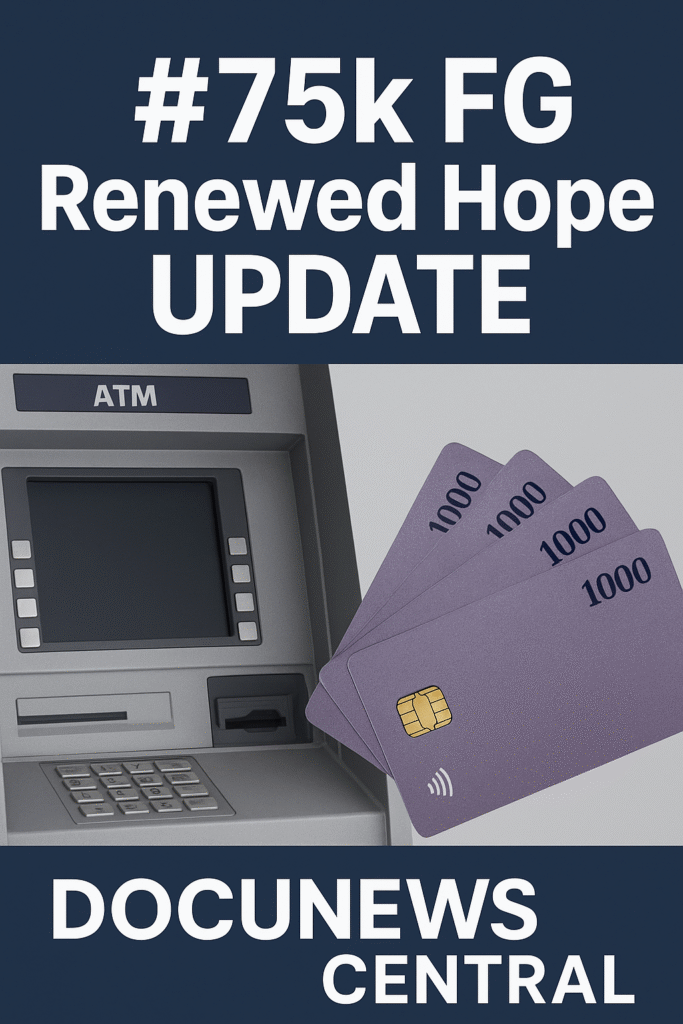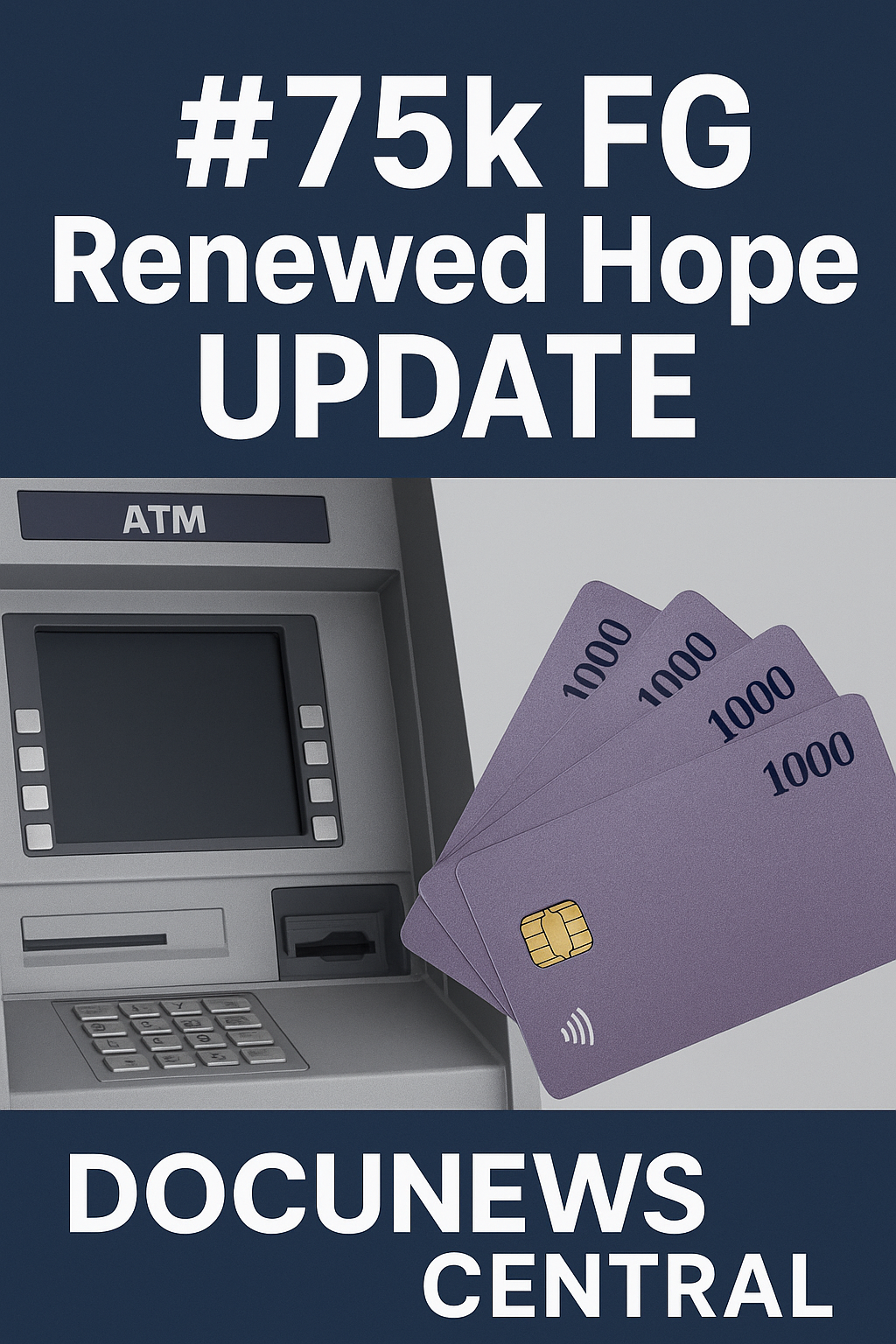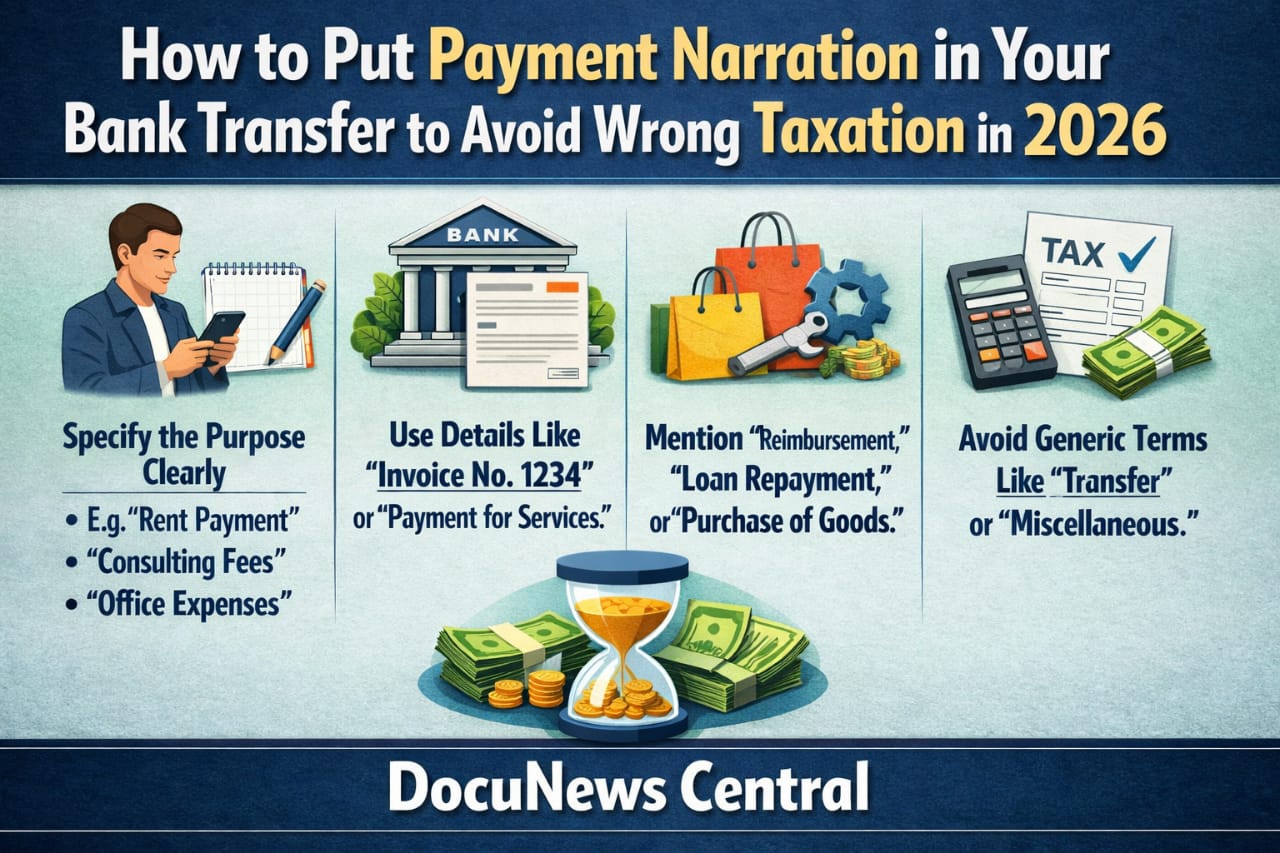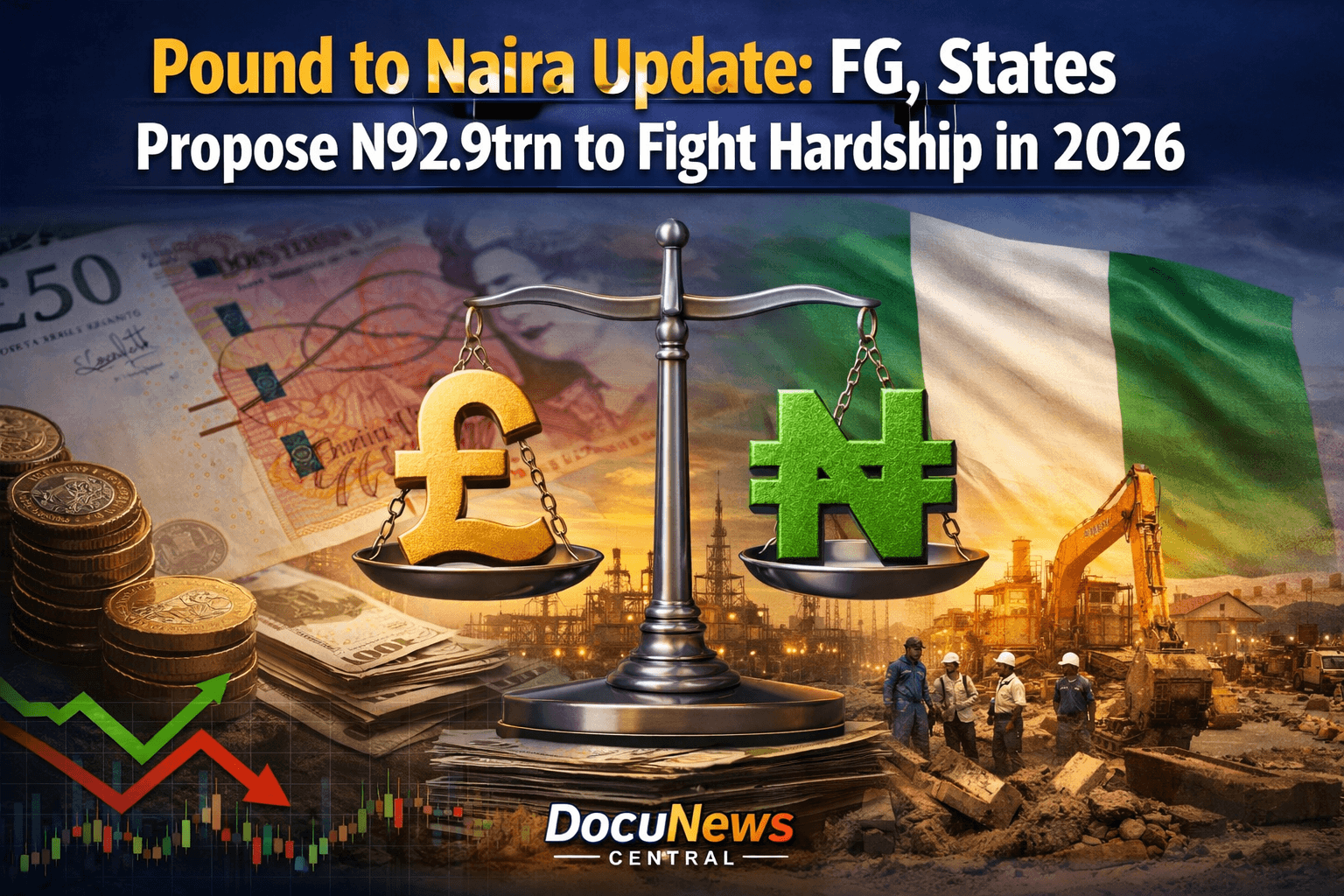
FG ₦75,000 ATM Cash-Transfer: What We Know, What We Don’t, and How South–South & South–East States Are Waiting
DocuNews Central Investigates the Controversial Federal Government ₦75,000 Cash Transfer Scheme From Gombe to the South
Introduction
#75K FG RENEWED HOPE UPDATE. When reports first surfaced that the Federal Government (FG) of Nigeria had begun disbursing ₦75,000 directly to citizens through newly issued ATM cards, the news spread like wildfire. It was said to have started in Gombe State, in Nigeria’s North-East, and quickly became a talking point across the country. On social media platforms such as X (formerly Twitter), Facebook, and WhatsApp, posts claimed that residents in other states would soon receive similar payments. The promise of direct cash relief, especially at a time of rising prices and economic stress, naturally caught the attention of millions.
But weeks have passed since the first images and messages emerged from Gombe, and questions continue to swirl: Is this truly a nationwide programme? Will the South–South and South–East regions—Rivers, Imo, Abia, Enugu, Anambra, Delta, Akwa Ibom, Cross River, Ebonyi—receive their share soon? Or is the entire exercise an elaborate scam riding on the desperation of Nigerians? DocuNews Central embarked on a detailed investigation, drawing on verified news reports, government statements, and state-level updates, to separate fact from fiction.
Background: The Promise of ₦75,000 Cash Transfers
Nigeria has a history of federal cash-transfer initiatives designed to cushion economic shocks for the most vulnerable. Over the past decade, successive administrations have implemented programmes like the Conditional Cash Transfer (CCT) under the National Social Investment Programme (NSIP). These efforts have typically targeted low-income households, aiming to reduce poverty and stimulate small-scale economic activity.
In 2024, the current administration announced the Renewed Hope Conditional Cash Transfer, promising up to ₦75,000 to selected vulnerable households over a three-month period. The idea was to help cushion the impact of fuel subsidy removal and inflation. According to official statements, beneficiaries would be drawn from the National Social Register—a database of poor and vulnerable households built over several years and used for previous interventions.
This set the stage for the Gombe story. In early 2025, pictures of people reportedly collecting newly issued debit cards for cash withdrawals began circulating. The claim was that the FG had begun issuing ATM cards loaded with ₦75,000 for immediate withdrawal.
Initial Rollout: Gombe Leads the Headlines
Multiple credible outlets, including The Guardian Nigeria and other mainstream sources, confirmed that Gombe was among the first states to receive the new round of cash transfers. Officials of the Ministry of Humanitarian Affairs and Poverty Alleviation organised events where pre-registered beneficiaries collected debit cards, sometimes referred to as “ATM cards,” from partner banks.
Beneficiaries were reportedly selected from the National Social Register and required to present valid identification—typically a National Identification Number (NIN) and Bank Verification Number (BVN). Once their cards were activated, they could withdraw the ₦75,000 in tranches.
The images and excitement from Gombe gave many Nigerians hope that their states would soon follow. But as the weeks passed, reality proved more complex.
Current Status Across Nigeria
Northern and Some South-West States Moving Ahead
The roll-out pattern is clearly phased. States such as Niger, Sokoto and parts of the North-West joined Gombe early on. Ondo State in the South-West also confirmed participation. For instance, The Hope Newspaper reported in mid-2025 that 16,255 beneficiaries in Ondo State were scheduled to receive ₦75,000 each across all 18 Local Government Areas. The programme in Ondo is reported to be fully active, with beneficiaries already using debit cards to access funds.
Akwa Ibom: First Confirmed South–South State
Among the states you asked about, Akwa Ibom stands out as the first with confirmed activity. Local reports from BusinessDay Nigeria and Radio Nigeria South-South revealed that Akwa Ibom had already seen ₦2.1 billion disbursed under the Conditional Cash Transfer programme between January and July 2025. The state government acknowledged that the funds were targeted at vulnerable households across all 31 LGAs.
Radio Nigeria also carried a specific report that Akwa Ibom was “set for ₦75,000 cash transfer to vulnerable households,” highlighting preparations for the Renewed Hope phase. This suggests that Akwa Ibom has effectively joined the early southern roll-out.
Ondo Provides a Model
Ondo’s example provides a glimpse of how the programme works where it is active. Beneficiaries are pre-identified from the Social Register. They receive SMS notifications indicating where and when to collect their cards. After presenting valid identification and completing verification, they receive a debit card—typically from a partner commercial bank—preloaded with the first tranche of funds. Payments are designed to be withdrawn via regular ATMs.
What We Found in Rivers, Imo, Abia, Enugu, Anambra, Delta, Cross River and Ebonyi
Despite persistent rumours and social-media chatter, DocuNews Central found no credible confirmation that these states have launched the ₦75,000 ATM cash-transfer phase.
Rivers State: No official press release or credible local media report confirms that the FG’s ATM-card cash-transfer scheme has begun. Neither the state government’s website nor its official social media channels mention any distribution of cards or cash.
Imo State: Similar silence. While Imo has participated in earlier rounds of federal social investment programmes, there is no verified statement about the ₦75,000 ATM scheme being active.
Abia and Enugu States: Searches of local media archives and government communications yielded no evidence of card distribution or payment under this new phase.
Anambra State: No announcement from the Ministry of Social Welfare or state government channels regarding the ₦75,000 cash transfer.
Delta State: Although Delta has been part of the National Social Register since the Buhari-era programmes, no credible 2025 update indicates that the Renewed Hope ₦75,000 transfer has begun.
Cross River and Ebonyi States: Like the others, there is no verified news that beneficiaries have received ATM cards or started cash withdrawals.
In short, aside from Akwa Ibom and Ondo, none of the South–South or South–East states you specified have public, credible evidence of participation—at least not at the time of this investigation.
Why the Slow Spread?
Officials from the Ministry of Humanitarian Affairs and Poverty Alleviation have stated in other contexts that the roll-out is phased, to manage logistics and ensure that only verified beneficiaries receive the funds. States are often added in batches, based on the completeness of their entries in the National Social Register and the readiness of local banking partners.
Moreover, the verification process requires beneficiaries to have valid NIN and BVN, and to have their households already listed in the national register. States with incomplete or outdated registers may experience delays.
Scams and Misinformation: A Growing Problem
The genuine federal cash-transfer programme has unfortunately become fertile ground for scammers. Across Nigeria, fraudsters circulate links claiming to offer “quick registration” for ₦75,000 ATM cash. These links typically lead to phishing websites designed to steal personal information or banking details.
The Federal Ministry of Humanitarian Affairs and Poverty Alleviation has repeatedly warned that there is no open online registration link for the ₦75,000 Renewed Hope cash transfer. Beneficiaries are drawn only from the existing National Social Register, and they are contacted directly via SMS. Citizens cannot sign up via a public website.
To protect yourself:
Ignore messages that promise a direct sign-up link.
Do not share your BVN, NIN or bank details with unknown persons or sites.
Report suspicious websites or messages to the Economic and Financial Crimes Commission (EFCC) via https://efcc.gov.ng/efcc/contact or the Nigerian Communications Commission (NCC) fraud helpdesk via https://www.ncc.gov.ng/.
How to Check if You Are Eligible
Although there is no online registration, you can still find out if your household is on the National Social Register:
- Contact Your Local Government Social Welfare Office. Each LGA has designated officers handling the register.
- Visit the State Ministry of Humanitarian Affairs (or Social Welfare). They can confirm if your household is listed.
- Watch for Official SMS Notifications. Only those pre-qualified and already on the register will receive instructions about where and when to collect their cards.
Remember: the government does not ask for money to include you on the list, and no “agent” can fast-track your eligibility.
The Bigger Picture: Nigeria’s Fight Against Poverty
The ₦75,000 cash-transfer initiative is part of a broader attempt to mitigate the effects of high inflation and subsidy removal. Economists have long debated the effectiveness of direct cash transfers. Proponents argue that giving poor households cash—rather than food or goods—allows them to prioritise their own needs, from school fees to small-business capital.
Critics worry about the sustainability of such programmes, questioning whether they address the root causes of poverty or merely provide temporary relief. Still, for many Nigerians, ₦75,000 represents a significant lifeline in the face of rising living costs.
DocuNews Central’s Call to Action
DocuNews Central urges readers to stay alert:
Rely only on credible news sources for updates on the ₦75,000 cash-transfer scheme.
Report fraudulent links or messages to the EFCC (https://efcc.gov.ng/efcc/contact) or NCC (https://www.ncc.gov.ng/).
Check with your local government social welfare office if you believe you may already be listed on the National Social Register.
Follow DocuNews Central for continuous updates as the federal government expands the roll-out to more states.
Conclusion
The story of the FG ₦75,000 ATM cash withdrawal that began in Gombe is neither pure fiction nor yet the nationwide reality that some social media posts suggest. It is a real federal initiative under the Renewed Hope Conditional Cash Transfer programme, but its expansion is gradual and controlled.
Gombe and several northern states, along with Ondo and Akwa Ibom, are confirmed participants.
The South–South and South–East states of Rivers, Imo, Abia, Enugu, Anambra, Delta, Cross River, and Ebonyi are still waiting for the official start of the ATM card distribution.
And—most importantly—there is no public registration link. Any website or message claiming to register you for ₦75,000 is a scam.
As Nigeria continues its phased approach to poverty alleviation, vigilance is key. The promise of ₦75,000 is real for those already on the National Social Register, but only patience and careful attention to official communication will ensure that citizens avoid fraud while waiting for their turn. For accurate, ongoing updates, stay with DocuNews Central—your trusted source for verified national news.
© DocuNews Central 2025












